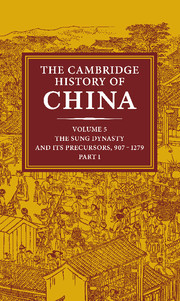Book contents
- Frontmatter
- Introduction: the Sung Dynasty and Its Precursors, 907–1279
- 1 The Five Dynasties
- 2 The Southern Kingdoms between the T’ang and the Sung, 907–979
- 3 Founding and Consolidation of the Sung Dynasty under T’ai-tsu (960–976), T’ai-tsung (976–997), and Chen-tsung (997–1022)
- 4 The Reigns of Jen-tsung (1022–1063) and Ying-tsung (1063–1067)
- 5 Shen-tsung’s Reign and the New Policies of Wang An-shih, 1067–1085
- 6 Che-tsung’s Reign (1085–1100) and the Age of Faction
- 7 The Reigns of Hui-tsung (1100–1126) and Ch’in-tsung (1126–1127) and the Fall of the Northern Sung
- 8 The Move to the South and the Reign of Kao-tsung (1127–1162)
- 9 The Reign of Hsiao-tsung (1162–1189)
- 10 The Reigns of Kuang-tsung (1189–1194) and Ning-tsung (1194–1224)
- 11 The Reign of Li-tsung (1224–1264)
- 12 The Reign of Tu-tsung (1264–1274) and His Successors to 1279
- Bibliography
- Glossary–Index
- References
6 - Che-tsung’s Reign (1085–1100) and the Age of Faction
Published online by Cambridge University Press: 28 March 2010
- Frontmatter
- Introduction: the Sung Dynasty and Its Precursors, 907–1279
- 1 The Five Dynasties
- 2 The Southern Kingdoms between the T’ang and the Sung, 907–979
- 3 Founding and Consolidation of the Sung Dynasty under T’ai-tsu (960–976), T’ai-tsung (976–997), and Chen-tsung (997–1022)
- 4 The Reigns of Jen-tsung (1022–1063) and Ying-tsung (1063–1067)
- 5 Shen-tsung’s Reign and the New Policies of Wang An-shih, 1067–1085
- 6 Che-tsung’s Reign (1085–1100) and the Age of Faction
- 7 The Reigns of Hui-tsung (1100–1126) and Ch’in-tsung (1126–1127) and the Fall of the Northern Sung
- 8 The Move to the South and the Reign of Kao-tsung (1127–1162)
- 9 The Reign of Hsiao-tsung (1162–1189)
- 10 The Reigns of Kuang-tsung (1189–1194) and Ning-tsung (1194–1224)
- 11 The Reign of Li-tsung (1224–1264)
- 12 The Reign of Tu-tsung (1264–1274) and His Successors to 1279
- Bibliography
- Glossary–Index
- References
Summary
retrogression: 1085–1086
Turning back the clock: The coming of the Hsüan-jen regency
As Emperor Shen-tsung (1048–85, r. 1067–85) lay dying at the age of thirty-seven, an era of relative political stability was fading along with him. Long held dormant by the force of Shen-tsung’s will, the personal and political animosities of his past and present ministers were stirring, now that their emperor’s untimely death would effect a new political alignment. Since his heir apparent was an eight-year-old boy, after the emperor’s passing executive powers would be wielded by a regent for the foreseeable future. Upon assuming the regency, Dowager Empress Hsüan-jen, a longtime opponent of Shen-tsung’s New Policies, would become the dominant force at court, throwing her support behind the conservative opposition and dooming the current reformist ministerial coalition. In the early spring of 1085, the specter of factional infighting was casting its shadow upon the corridors of power, as two hostile court coalitions readied themselves for a protracted and acrimonious struggle for dominance. When the conflict ended a year and a half later, after the most sweeping political purge thus far in the history of the dynasty, a new conservative ministerial regime would establish firm control over policy and polity and would reverse – they thought for good – the reform policies of the Shen-tsung reign.
- Type
- Chapter
- Information
- The Cambridge History of China , pp. 484 - 555Publisher: Cambridge University PressPrint publication year: 2009
References
- 2
- Cited by



